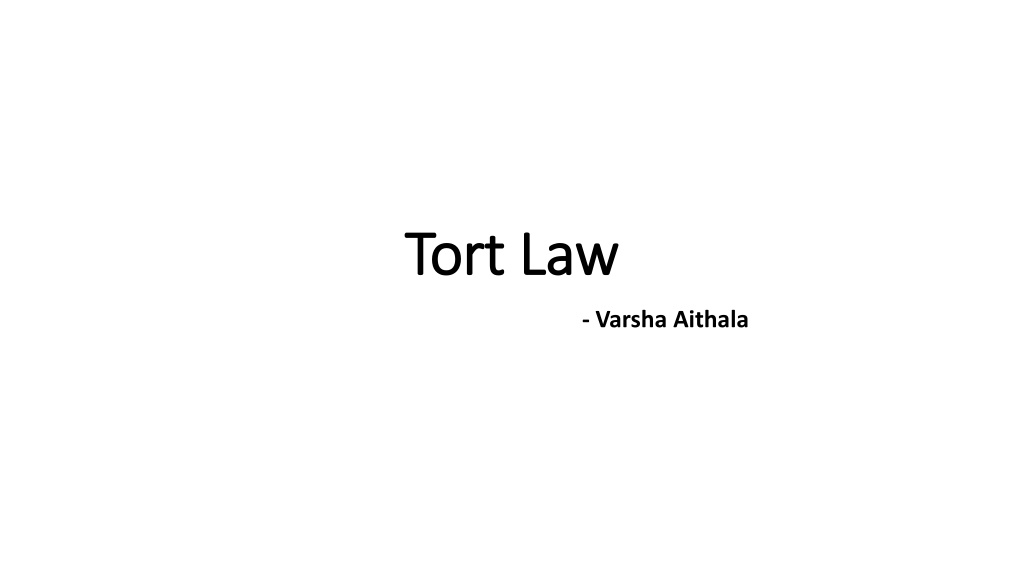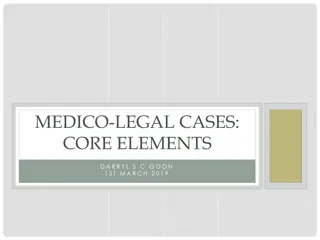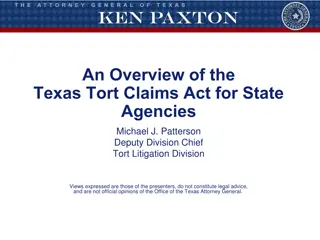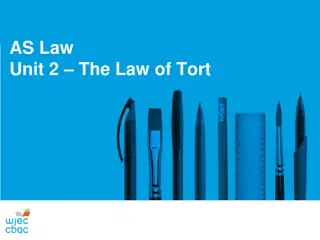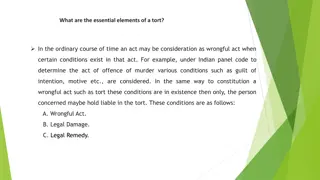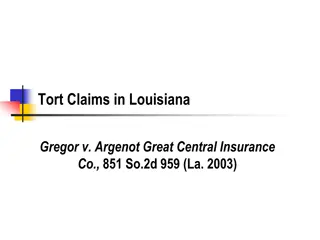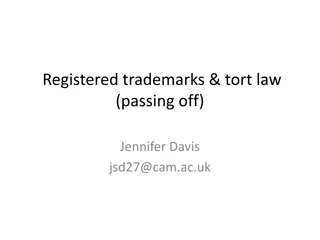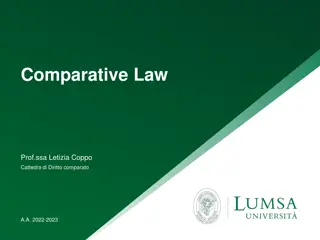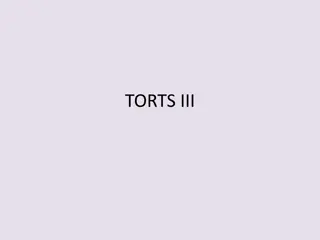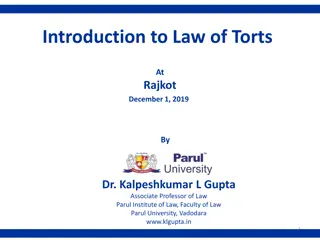Understanding Tort Law: Elements and Examples
Tort law encompasses civil wrongs such as negligence, duty of care, proximity, and breach of duty. Through real-life examples like loud music disturbance, cycling accidents, and environmental pollution, one can grasp the importance of studying tort law. Explore the concepts of foreseeability, proximate relationships, and fairness in determining liability for harm caused.
Download Presentation

Please find below an Image/Link to download the presentation.
The content on the website is provided AS IS for your information and personal use only. It may not be sold, licensed, or shared on other websites without obtaining consent from the author. Download presentation by click this link. If you encounter any issues during the download, it is possible that the publisher has removed the file from their server.
E N D
Presentation Transcript
Tort Law Tort Law - Varsha Aithala
What is tort law What is tort law? Elements of a Tort Why should we study it? https://www.youtube.com/watch?v=jQ6smN3lcnY Examples: 1. Your neighbour plays loud music every night after 11 pm. 2. You are cycling on the bike lane and a motorist comes so close to you, that he knocks you off balance 3. A factory in your neighbourhood is emitting thick black smoke which makes the sky around your locality smoggy all the time TASK: Individually or in groups create a list of different offences which you would class as either criminal or civil - This will help you cement your understanding of civil wrongs
Negligence Duty of care! Foreseeable Example: Donoghue v. Stevenson snail in the bottle case https://www.youtube.com/watch?v=WgEYzgrNvy0 Neighbour principle- take reasonable care to avoid harm to those we foresee can be affected Lord Atkin: There must be, and is, some general conception of relations giving rise to a duty of care, of which the particular cases found in the books are but instances .The rule that you are to love your neighbour becomes in law, you must not injure your neighbour; and the lawyer s question, Who is my neighbour? receives a restricted reply. You must take reasonable care to avoid acts or omissions which you can reasonably foresee would be likely to injure your neighbour. Who, then, in law is my neighbour? The answer seems to be persons who are so closely and directly affected by my act that I ought reasonably to have them in my contemplation as being so affected when I am directing my mind to the acts or omissions which are called in question Was it reasonably foreseeable that the claimant would be injured? TASK: Who is your neighbour? Think about today, your journey to school or the people you have come into contact with. What are the actions/omissions that could injure your neighbour?
Proximity - Is there a proximate relationship between the person owing the duty and to whom it is owed? Example: Bourhill v. Young Mr. Young crashed his motorcycle in an accident. At the same time, Mrs. Bourhill was a pregnant lady getting on her tram she did NOT see the accident and was over 50 yards away. Sometime later, she came to the scene AFTER it was cleared up and saw some blood on the road. She got so upset that it unnerved her, and resulted in a stillbirth. She claimed that she was proximate to the incident and that caused injury to her. TASK: Mrs. A was in office. She gets a call from a friend that her family is tragically injured in a car accident. The accident happened four hours ago. She was not at the accident venue. She comes into the hospital ward- sees her husband unconscious, her daughter and son badly injured. They are still covered in mud and oil and its looking like dried out blood. She faints and needs to be hospitalised too. Is there proximity? What is the need for this rule? Argue FOR and AGAINST Who do you owe a duty to?
Fair and reasonable Example: Caparo test Is it fair, just & reasonable to impose such duty? Breach of duty of care Facts: A customer came to HB asking for additional credit. HB wrote to a customer s bank (Heller) asking about the customer s solvency. Heller replied that the customer was good for the money but without responsibility of the bank . Customer shortly went bankrupt. TASK: Bolton v Stone V/S Miller v. Jackson Facts 1: A game of cricket was being played at a local cricket club. A ball was hit out with such force that it escaped from the high hedges and hit a man walking on the pavement next to the club. This had never occurred before. Facts 2: When game of cricket was being played at a local cricket club, regularly, balls were hit out with such force. They constantly escaped from the high hedges and hit people walking on the pavement next to the club. Once, someone decided to complain. Is there a breach of duty in both cases? Fair, Just & Reasonable Duty of care Proximate
Reasonable man/woman = man on the Clapham omnibus Causation - BALANCE OF PROBABILITIES - But for - Did the specific breach of duty lead to actual harm? Example: A patient came to the casualty department of a hospital complaining of severe stomach ache after drinking tea. The ward officer asked him to go home and return in the morning. The patient died in the night. Medical reports said that the death was from arsenic poisoning. However, the poisoning was so far spread out that the doctors could not have saved. - Contribution https://www.youtube.com/watch?v=ipstJuZMCMw Example: - Novus actus interveniens EXAMPLE: ? Original Act Injury
- Different causes EXAMPLE: You work as a cleaner in a shop floor. You use the wrong polish to clean the shop floor. This makes the floor super slippery. You realise your mistake as soon as you are done, but then you receive an urgent phone call. Since the shop isn t open yet, you decide to clean up after your call. You come back after 30 minutes and see that your shop owner has fallen and injured her back badly. She was wearing pencil heels and slipped. She had told you yesterday that she would be on holiday and was not expected to come to the shop!! DEFENSES - Contributory negligence Example: A was attacked and beaten up by thugs near King s Cross late at night next to a caf he worked at. One eye was badly injured when he reached the hospital- eye surgeon- negligent operation- A became blind. Due to the trauma of the attack and blindness, A became a nervous wreck. - Does this work in practice? Are they clearly divisible like this? Is this a good decision? What about the thugs who actually started the whole thing? Is this fair? - Assumption of Risk/Volenti Non Fit Injuria https://www.youtube.com/watch?v=Q9fJNK9tRGc - Exclusion of Liability - Illegality ex turpi causa non oritur action - Insanity
Nuisance What is? An unreasonable interference with another sright arising out of a continuous state of affairs Example 1 : Your neighbours are having a barbeque today (being the first day of summer) and you don t like the smell of the food. Example 2: You stay next to a hostel. Even though strictly non-smoking premises, one of the residents of the hostel started smoking. The hostel keeper did not ensure that there were smoke detectors in rooms and did not kept any fire extinguishers on the premises that fire damaged your property. An occupier must take all steps to deal with actual hazards on his premises, even if he has done nothing to create them lest they create damage to the neighbour Private nuisance Public nuisance EXAMPLE: The local corporation has blocked a portion of the road for repairing the street lights. They did not inform the residents that the road would be blocked. A was checking his phone while walking on the road and did not see that there was a huge trench on the road he falls into it and breaks his leg. Who can sue? - Any person who has interest in the land TASK 1: https://www.youtube.com/watch?v=Dk_-W-mWo0w
Defamation What does it mean? A is a journalist. A tells C that B who is a budding actress has a big bum. Elements (i) a defamatory statement (ii) that refers to the claimant (B) (iii) that is published i.e. communicated to a third person (even one third party is sufficient) (iv) that causes damage to the claimant (B) (v) defendant is the type of person against whom a claim of defamation can be brought - legal capacity to be sued Libel Slander Reasonable (Wo)man objective test REM: It is not what A intends to say, but what the words said by A is reasonably intended to convey- so even if someone writes about a fictitious character but B believes that to the reader this will be assumed to be her B has a claim. Example : ????
Defences to Defamation Truth absolute justification, motive irrelevant REM: Breach of privacy Example: CTB v News Group Newspapers Ltd Footie Star s Affair with Big Bro Imogen Right to respect for private life Privilege - Absolute or qualified Public interest Innocent dissemination Honest opinion or comment Consent
Other torts Other torts Strict liability - Rylands v. Fletcher Absolute liability Vicarious liability
Remedies Damages A worker is injured in factory due to employer s negligence, he is entitled to (i) take home salary he would have got and (ii) salary lost due to his accelerated death that he will not live to earn and (iii) increased expenditure due to personal injury i.e. cost of medical treatment, post- operative care, prosthetic devices etc. Duty To Mitigate Loss/Damage Facts: A was recklessly driving on the motorway and seriously injured B, a cyclist- who suffered multiple injuries to his arms and legs due to the collision. B s cycle was crushed. A immediately rushed B to the hospital and offered to pay for his entire treatment. B had been bleeding due to the multiple injuries but refused to undergo blood transfusion because it was against his beliefs. B s condition worsened and finally, B fell unconscious had to be operated on for several hours before stabilising. B now sued A for the entire costs of his medical treatment, pain and suffering he endured due to the accident and for loss of his future earnings as his limbs are weakened due to the surgery claiming that he cannot carry out his regular employment, of a manual labourer. He is also claiming entire costs of repair or replacement of his bike, and damages for sentimentalvalue attached to his bike. What are the grounds that Courts might pay B damages for? Could the claimant have done anything to avoid the losses? Give an example each? Example: If a person claiming for lost income finds alternate employment, he must deduct these wages from the amount claimed. One cannot claim for a loss they could have avoided. Types: Nominal General Special Aggravated Exemplary/punitive Liquidated Unliquidated
Injunction - Permanent - Temporary Removal of defaming statements Apology or offer of amends Quiz: https://lawdojo.co/p/10/torts
Quick recap Tortfeasor (single or joint) Tort Reasonable man
